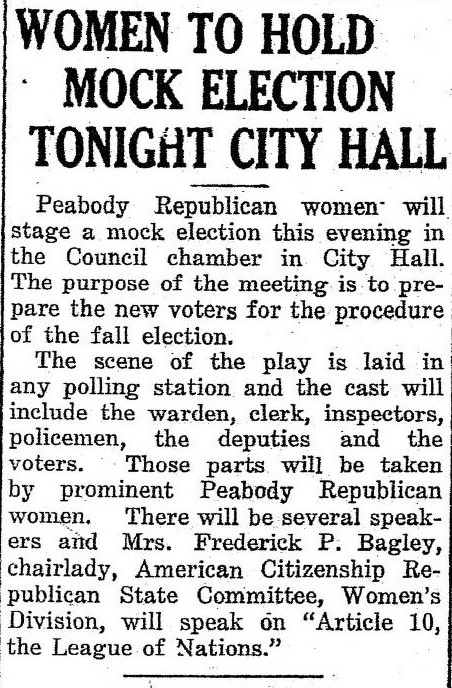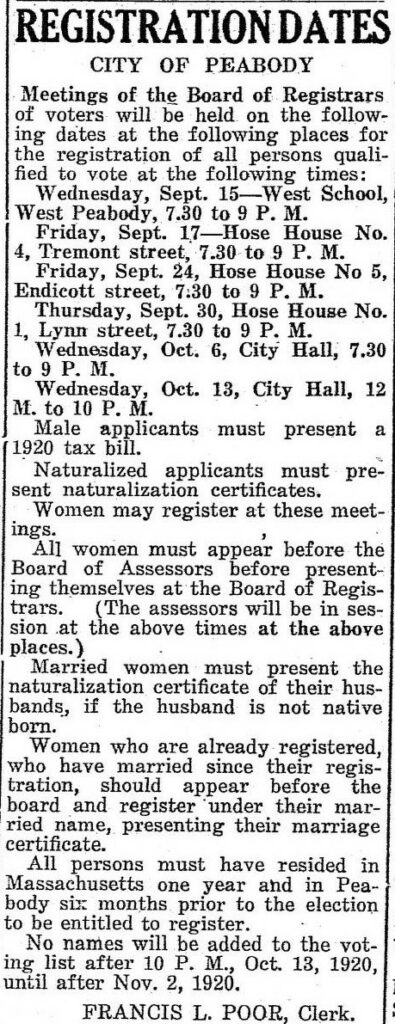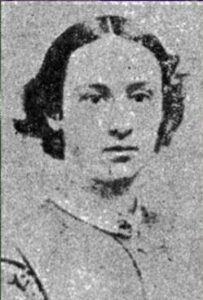100 years ago – American women finally got the right to vote.
Let’s visit Peabody in 1920 – not so different from today and yet a world away.
The City of Peabody was preparing for a Presidential Election & women joined the ranks of the voting population.


Peabody Enterprise
September 10, 1920
 How did the women of Peabody get the right to vote?
How did the women of Peabody get the right to vote?One advocate at a time, which brings us to our own – Mary Ophelia Stevens.
.
Mary Ophelia Townsend was born on March 29, 1842 in South Danvers (now Peabody), Massachusetts. Mary was the daughter of Daniel Hacker and Rebecca Ophelia (Gould) Townsend. Mary, the eldest of three children, would take on more responsibility with her mother’s passing in 1850. Her younger brothers, Charles Hacker (1844-1893) and Eugene Putnam (1846-1896), enlisted in the Union Army. Charles was only 17 at the time and Eugene barely 15.
As a woman, Mary Townsend could not enlist, but she soon found another way to serve her country in the Civil War. Physicians desperately needed assistance in treating the growing number of wounded soldiers. Inspired by the work of Florence Nightingale during the Crimean War, social reformer Dorothea Dix organized a volunteer corp of female nurses. Mary Ophelia Townsend joined their ranks in 1864. She worked at the Seminary Hospital as well as the Columbia Hospital in Washington DC.
However, once the war ended, female nurses were no longer needed. As she ended her time in Washington DC, she met Daniel Dickinson Stevens (1839-1916) of Tennessee. Stevens, a Navy Quartermaster, was visiting Washington DC. Mary Townsend and Daniel Stevens likely connected over their shared New England heritage, as Stevens’ mother was from Boston and his father from New Hampshire. Mary and Daniel Stevens married in 1868 and returned to Massachusetts. Mary committed herself to social issues and reform. She lobbied much of her married life for her husband to be awarded the Congressional Medal of Honor for his acts of bravery at the Second Battle of Fort Fisher in North Carolina. Stevens fought valiantly and “he three times replaced the flag when it was shot away on the monitor Canonicus.” The USS Canonicus took 36 hits during the Battle, but the Union was victorious. Due to Mary Stevens’ persistence, her husband received the Medal of Honor in 1916.
Mary Ophelia Stevens championed temperance as well as women’s suffrage. She formed the Peabody Suffrage League and acted as its President in 1889. She served on the Resolution Committee for the Prohibition Party of Massachusetts. Of the 15 members, only 2 were women. Mary traveled to St. Louis, Missouri on behalf of the Massachusetts delegation for the Woman’s Christian Temperance Union.
In 1913, Mary Ophelia Stevens represented all Civil War nurses at the 50th Anniversary of the Battle at Gettysburg. The Grand Army of the Republic bestowed ceremonial badges to the 25 surviving Civil War nurses in 1915. They displayed their regalia as they paraded down Pennsylvania Avenue in Washington DC. The women were recognized for their courage and dedication. However, the victory was incomplete. They were not considered equal citizens, as they did not have the right to vote. Mary Ophelia Stevens continued her commitment to women’s suffrage, by serving as the president of Peabody’s Women’s Suffrage League in 1915.
After years of struggle and sacrifice, the hard fought battle was won. The Nineteenth Amendment, giving women the right to vote, was ratified on August 18, 1920. A mere two days later on August 20th, Mary Ophelia Stevens registered to vote at Peabody City Hall.
References
“The Prohibitionists,” Boston Herald, September 11, 1884.
“Minor Events at Home,” Boston Herald, January 17, 1889.
“The Convention Organizes and Chairman Hempton Delivers His Address,” Boston Journal, September 4, 1889.
“Asbury Grove, Interesting Services during the Day at Hamilton,” Boston Journal, August 23, 1890.
“Woman and What She is Doing,” Springfield Union (Springfield, MA), July 27, 1913.
“Peabody,” The Boston Daily Globe, February 28, 1915.
“Surviving Civil War Nurses are Here for Probably their Last Encampment,” Evening Star (Washington DC), September 29, 1915.
“How Three Bay State Soldiers Won for Heroic Action,” Boston Herald, October 1, 1916.
“Coolidge Praises Civil War Nurses,” Boston Herald, April 13, 1927.
Barthelemy, Nancy. “Half of Our Citizens: Mary Ophelia Stevens,” The South Danvers Observer, 2010.
Archives, Peabody Historical Society and Museum, Peabody, MA, 2017.
Massachusetts and Maine Records (Birth, Marriage and Death and Federal Census), Accessed via Ancestry.com
